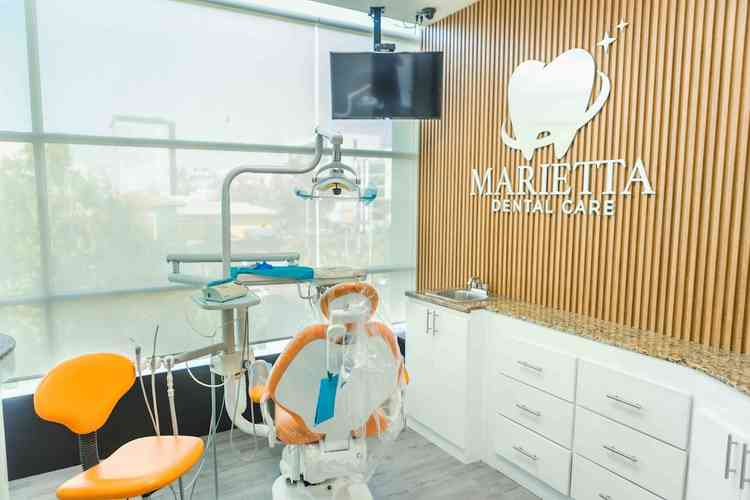Get a New Smile - All About Teeth Implants

Prathyusha Itikarlapalli
- Content Writer

Table of contents
None
Key Takeaways
- Dental implants function as missing tooth roots and gift you a warm, radiant new smile.
- Getting teeth implants is a surgical outpatient procedure and will be performed under anesthesia.
- Use painkillers and apply ice packs to mitigate pain and swelling after dental implant surgery.
- Follow proper oral hygiene and attend regular dental checkups for the long-term success of dental implants.
Your life gets a boost with implants! Take pleasure in savoring your favorite fries once again. But wait, there’s more! Teeth implants offer a truly transformative experience. You’ll be able to showcase that smile, which is hard to hide anymore! And guess what? These new pearl whites look more like natural teeth.
Your dentist will fix a screw-like portion in place of fallen teeth inside your jawbone. On the top, these bear the white-colored crown part.
These tiny metal fixtures bring about the confidence you have longed for. They improve your bite force and gift you a confident smile by avoiding sunken cheeks. More importantly, these blend seamlessly with your existing teeth, making it hard to find they're not real.
Teeth planting is a step-wise procedure. Knowing the details would be better for handling it with ease.
Dental Implant Surgery: How It Begins?
Getting dental implants involves a series of outpatient visits to your dentist's office. The process begins with an initial consultation to confirm your eligibility.
Further, your dentist will take time to get to know your oral and medical history. Don’t hesitate to share any medications you are currently taking. Besides, your dentist will discuss the other options like dentures and bridges and address your concerns.
If your jawbone deteriorates your dentist recommends ridge augmentation and bone grafting. More importantly, they will discuss the anesthesia options for surgery. Following this, your dentist will make a treatment plan and schedule appointments for your implant surgery.
How Do You Prepare to Get a New Smile With Teeth Implants?
After your first visit to the dentist, it’s time to make a few adjustments in preparation for dental implant success. Let’s walk through these steps now.
- Smoking: Smoking doesn’t play well for dental implants. If you smoke, you’ll be twice as likely to have problems compared to non-smokers.[1] It’s better to put down your cigarettes at least a week before your dental implant surgery. [2]
- Medications: Depending on your health condition, your dentist may suggest adjusting the medicines, like blood thinner dosage, before surgery. It can be decreasing the dose or temporarily stopping the dosage to avoid uncontrolled bleeding during your implant surgery.
- Oral hygiene: A clean oral cavity will prevent implant site infections. So, maintain a healthy oral routine to keep your gums and teeth healthy, ensuring dental implant success.
- Driver and companion: Although dental implant surgery is an outpatient procedure, having a buddy to accompany you and drive you home would help.
- Take time off work: Give yourself a break for 1-2 days. With pain medication and a special diet in play, your body needs downtime to heal.
Once you’ve got these steps down, it’s on to the appointments for implants, abutments, and finally, your artificial teeth.
What Happens During Dental Implant Surgery?
During your initial appointment, you will receive IV sedation or local anesthesia near the gums. Once comfortably seated on the dental chair, your dentist will cut open the gums where implants will be fixed. Next, they’ll drill holes into the jawbone to place the implants and close the incisions. These newly placed implants will be left to heal and fuse with the jawbone. This is an important stage in the dental implant procedure and can take a few months.
Your dentist will schedule your second appointment after complete healing. Fixing abutment is a simple procedure under local anesthesia. Your dentist will cut open the gums and affix a small metal abutment on the implants. They’ll leave the site to heal for 1-2 weeks after closing the incisions. Alongside, your dentist will collect impressions of your teeth to order customized crowns or fixed bridges.
The final appointment will be after your gums have completely healed and your customized teeth are ready. Your dentist will fix the prosthetic teeth on the abutment. Make sure you check the bite and teeth alignment. Furthermore, get to know the aftercare tips for your new teeth.
How Do You Care for Implants Immediately After Dental Implant Surgery?
Here are the steps for caring your dental implants early after surgery:
- Managing pain: Immediately after the dental implant surgery, your jaws will be numb due to sedation. However, you will experience discomfort, soreness, and pain as the anesthesia wears off. Apply an ice pack to reduce swelling and pain. Use painkillers for at least 4 days. Gradually, your pain will subside. Don’t hesitate to see your dentist if the pain persists after a week.[3]
- Dietary considerations: Provide your body with essential nutrients to heal well. Rely on liquid foods like smoothies, cold soups, sugar-free juices, and bone broth for the first 24 hours after getting implants. After 24 hours, slowly move to soft foods like applesauce, steamed veggies, baked and mashed potatoes, mashed avocados, and scrambled eggs. Avoiding hard nuts, crackers, sticky gums, crunchy chips, hot soups, and acidic and citrus foods is always good.
- Resting position: The implant site may bleed slightly. Keep a gauge over the surgical site and hold it with a gentle bite. Sleep with your head in an elevated position and not on the side. Bleeding usually stops within 4-5 hours.
After getting the prosthesis, you’ll have to start caring for your new teeth. Although implants do not decay, bacteria can gather around implants and cause gum inflammation.
Caring for Your New Teeth in the Long Run
Dental implants are durable and last for a lifetime with proper care. Care for your new teeth as you do for natural teeth.
- Hygiene: Follow proper oral hygiene because tartar and plaques may build up, resulting in the loosening of implants. Brushing and flossing your teeth twice a day works better. Use interdental brushes, water pik, or water flossing for brushing. Keep away from abrasive toothpaste and teeth-whitening agents.
- Checkups: Visit your dentist every 6 months after you get your new teeth. Implant loosening, unusual swelling, pain, and inflamed or receding gums are signs of implant failure. Don’t hesitate to see your dentist if you notice these symptoms.
- Diet: Follow a healthy dietary routine by including vitamins and minerals like zinc and calcium for healthy gums. Chewing gums and candies can damage your implants. Therefore, avoid them. Instead, go for fresh fruits and vegetables for effective healing.
- Smoking: Tobacco can harm the new teeth. Hence, it is better to avoid smoking for at least 2 months after implant surgery.
References
Disclaimer
The information in this article is for educational purposes only and does not replace medical advice. Always consult your doctor before starting any treatments.
Teeth implants last for a lifetime with proper care and maintenance. The restorations on implants last for 5-10 years.[4]
Dental implants restore a healthy smile by removing the awkward gaps left by missing teeth. They impart support to lips and fullness to cheeks, preventing them from sinking in. Overall, implants gift a defined facial contour.
Dental implants serve for single-tooth loss as well as complete tooth loss. You may choose single or full-mouth implants depending on the number of teeth lost.
So, we partner with the premier healthcare facilities!
Send me the list


